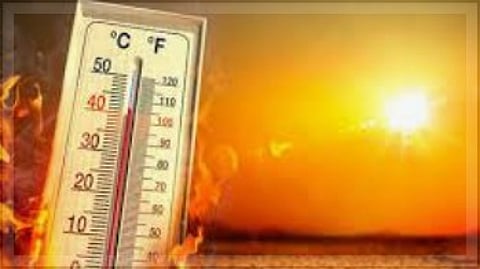

MARGAO/PANJIM: As Goa continues to endure sweltering conditions, hospitals across the state are witnessing a notable increase in patients-many suffering from ailments indirectly triggered by the persistent heat wave that is sweeping across the state. The India Meteorological Department (IMD) has extend-ed the yellow alert for heat over Goa till March 13, 2025, marking the 11th consecutive day of the warning.
Healthcare facilities are feeling the impact as doctor's report treating various conditions that, while not always directly caused by heat exposure, are frequently exacerbated by it. Herald spoke to several doctors who shared their observations and concerns.
Dr Prithi Araujo, Senior Consultant Physician at Victor Hospital in Margan, says: "These days, due to the rising temperatures in Goa, the increased humidity and excessive sweating have led to symptoms of thirst, nausea, vomiting, palpitations, fatigue, muscle cramps, and sometimes syncopal attacks (fainting) She went on to add: "People should hydrate themselves with water, cool liquids, and iced tea. They should wear lighter and more breathable clothes like cotton and linen and should eat fresh fruits and vegetables like watermelon, cucumber, and oranges. They should avoid going out in the hot sun without a hat er an umbrella. Such preventive measures will help to prevent illnesses like electrolyte imbalance, urinary tract infections, respiratory tract infections, heat strokes, and will reduce hospital admissions"
Dr Pravin Bhat, Senior Pulmonologist with Horizon Hospital in Margan, agreed that the heat wave has been particularly severe this week. He emphasized the importance of taking precautions: "Ade-quate hydration, avoiding midday outings unless un avoidable, knowing heat stroke symptoms-warm body, extreme thirst, dryness of mouth, nausea, vomiting, rapid pulse and respiration, excessive sweating, less urine, feeling dizzy, convulsions, coma. Elderly people and those with medical problems and on long-term medications like diuretics should take extra care," he said.
ENT Surgeon Dr Jorson Fernandes from South Goa explained that while a heat wave occurs when temperatures exceed the average normal for that time, there are more cases of heat stress or heat exhaustion, which can be treated. He made this distinction so that people do not mistake this for heat stroke, which is a medical emergency and is not being reported that much.
"What we see in our clinics are patients under heat stress, complaining of decreased output and performance in their work. Same complain of heat exhaustion and heat stress. Many patients who are on medications or have fever, diarrhea, or vomiting will be more vulnerable to heat exhaustion and will need admission because of dehydration," said Dr Fernandes.
Former State President of the Indian Medical As sociation (IMA), Dr Sandesh Chodankar, believes there is sufficient awareness but still encourages the public to take care. "People should hydrate them-selves frequently and make sure that they drink five to six liters of water per day," said Chodankar.
Dr Brendan Perez, Pathologist and Lab Head at Pathkind Labs in Panjim, talks about a telling pat-tern. "There has been a steady rise in community-ac quired infections due to various gatherings, however, a significant number of individuals are complaining of lethargy and tiredness. This could be attributed to the rising temperatures that would cause dehydration and heat exhaustion-related symptoms. Goa, being a relatively more humid state, tends to cause excessive sweating, thus electrolyte and fluid imbalances are anticipated. An illness as common as diarrhea poses a significant risk of causing AKI (acute kidney injury) if the dehydration isn't corrected by drinking ORS, cautioned Dr Peroz
Dr Clarissa E De Souza, Medical Officer in North Gaa, has noted a distinct increase in heat-related cases. There is a rise in the number of cases due to the excess heat. Caves of exhaustion and cramps at work are more now. Because of unhealthy lifestyles and improper dietary habits, we already get patients with exhaustion and cramps, but of late, the heat wave has caused a rise in the above. Muscle cramps and exhaustion mostly result from electrolyte deficiencies and/or not hydrating oneself properly. The heat wave has increased the risk of these ailments", she explained.
Dr De Souza also highlighted links between the heat and other common illnesses: "When it comes to the viral flu that's going around, anything that causes a drop in the body's immunity predisposes someone to the flu, and the heat does precisely this. Coming to urinary tract infections, dehydration among other factors, predisposes a person to a IFTI, again, caused by excess heat exposure".
Her advice is straightforward but critical: "To prevent ailments due to beat, drink at least 3-4 liters of water per day, although heart and kidney patients need to have the recommended amount of water. Have enough electrolytes, like fresh fruit juices and ORS. Limit strenuous physical activity as the heat generated can also increase the risk. Wear comfort able, cotton, breathable clothing and stay in an aerated environment. And those patients taking certain medications like diuretics must take extra precautions to ensure that they're replenishing the electrolytes lost. If one feels like they're experiencing symptoms like muscle cramps, exhaustion, light-headedness/dizziness, nausea, unusually warm skin, dryness of mouth, it could be due to excessive heat... in that case. visit your nearest doctor, hydrate, and have ORS/electrolytes".
The Directorate of Health Services (DHS) has issued a public health advisory recommending hydration with water, lemon drinks, coconut water, and watery fruits, along with using head coverings and wearing light, loose clothing outdoors. The public is advised to call 108 immediately for anyone with a high body temperature who is unconscious or confused and to cool them while awaiting help. Panjim recorded a maximum temperature of 33.2°C in the last 24 hours, with predictions of temperatures reaching 36°C on March 13 and around 35°C until March 16.